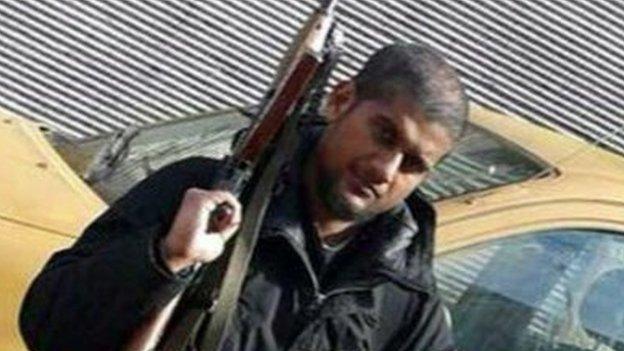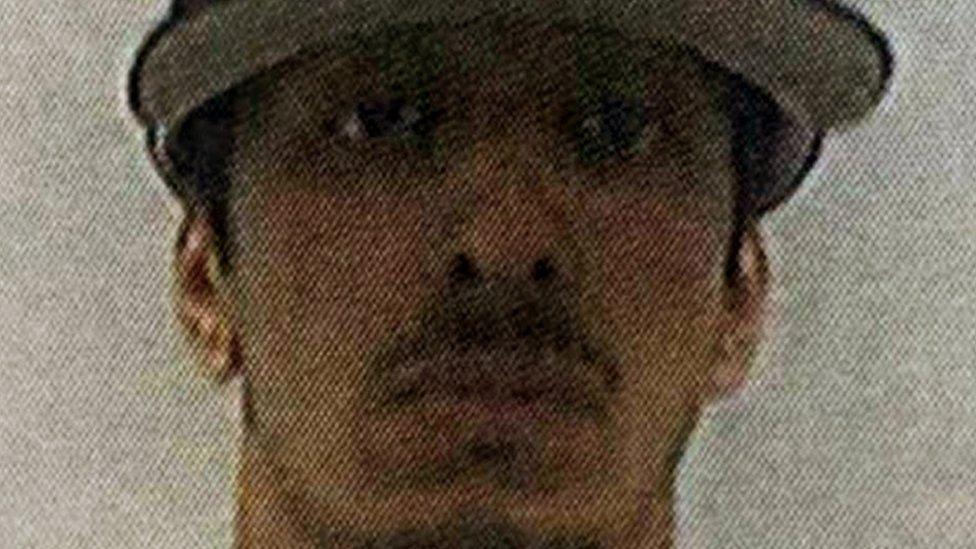Islamic State 'spy killings' video desperate stuff, says PM
- Published
Siddhartha Dhar's sister, Konika Dhar: "Audio resembles voice of my brother... but I wasn't entirely convinced"
A video by so-called Islamic State (IS) featuring a man and young boy with British accents is "desperate stuff", Prime Minister David Cameron has said.
The film, which purports to show the killing of five men who IS says were spying for the UK, is from a group that is "losing territory" and "increasingly losing anybody's sympathy", he said.
The UK's intelligence agencies are examining the footage.
Voice-print analysis will be carried out to try to identify the masked man.
The man says the 10-minute video - which has not been independently verified - is a message for David Cameron, and he threatens attacks in the UK.
In the video, the masked man, who is holding a gun, mocks Mr Cameron for daring to "challenge the might" of the extremist group.
He goes on to say: "We will continue to wage jihad, break borders and one day invade your land where we will rule by the Sharia."
'Desperate stuff'
There has been growing speculation the man could be Siddhartha Dhar, a British jihadist arrested in 2014, who later jumped bail and subsequently appeared in Syria.

Siddhartha Dhar
The sister of Mr Dhar - who is also known as Abu Rumaysah - has told the BBC that when she first heard the audio of the video she feared it was her brother, although having later viewed the pictures, she was not entirely convinced it was him.
"I was in a state of shock," said Konika Dhar.
"I believed the audio to resemble, from what I remember, the voice of my brother but having viewed the short clip in detail, I wasn't entirely convinced which put me at ease".
A senior member of the banned Islamist extremist group al-Muhajiroun, however, has told the BBC he "has no doubt" that the voice is that of Mr Dhar.
BBC security correspondent Gordon Corera said confirmation of the masked man's identity was not going to come quickly.
"I don't think the security services will want to necessarily go public unless they have to with confirmation because in their eyes, this is a live investigation and they don't want to have a running public commentary about it," he said.
'It's my grandson'
Children regularly feature in IS propaganda videos and the brief appearance of a child - apparently with a British accent - at the end of the video will also most likely be of interest to the authorities, he added.
Meanwhile, Channel 4 News reported that a south London man they named as Sunday Dare recognised the boy in the video as his grandson Isa Dare, who was taken to Syria by his daughter Grace Dare.
"It's my grandson, I can't disown him, he's my grandson. I know him very well," he said, adding that he was being used for propaganda and "as a shield".
He said his daughter "should come back and face the music because she has let herself down".
Grace Dare, who also goes by the name Khadijah, comes from a British-Nigerian background and converted to Islam when she was 18. She travelled to Syria in 2013, aged 22.
David Cameron: "Britain will never be cowed by this sort of terrorism"
On a visit to east London, Mr Cameron said the video was "desperate stuff" from a group that carried out "the most utterly despicable and ghastly acts".
"But this is an organisation that's losing territory, it's losing ground, it's, I think, increasingly losing anybody's sympathy," he said.
He said IS hated the UK for being a "successful, tolerant, democratic, multi-faith, multi-ethnic nation", but added that Britain would "never be cowed".
Speaking to radio station LBC, Mr Cameron said he had viewed "part" of the execution video.
He said media organisations should "use their judgement" about showing the video, adding: "I don't mind people seeing, within limits, a little bit of this just to remind them about what a truly ghastly, murderous organisation we're up against."
Islamic State's child militants
Watch: Inside Ramadi amid IS battle
The video shows five men, wearing jumpsuits and kneeling in a desert location, who appear to be shot in the back of the head, after making what is claimed to be their confessions.
One of the men says he had been asked to provide information about the location of IS militants, including two Britons, apparently to help target them with air strikes.
Some of the five say they are from Raqqa in Syria while another says he is from Benghazi, Libya, but none say they are from the UK.
A member of a Raqqa-based group which opposes IS, Abu al-Furat, told the BBC the victims included shopkeepers and businessmen from the town, and he doubted any of them were spying for Britain.
IS claimed that one of them had been using his internet cafe for spying purposes, he said.
"I know personally two of them, who started demonstrating very early," he said. "They are the sons of the Syrian revolution in Raqqa."
After the apparent killings the young boy, who seems to be aged about six or seven years old and is wearing military-style clothing, is seen pointing into the distance and talking about killing "unbelievers".
'Absolutely paranoid'
IS has previously released propaganda videos showing killings, including footage showing the apparent beheading of two US journalists, James Foley and Steven Sotloff, and two British aid workers David Haines and Alan Henning.
Mohammed Emwazi, the Briton who became known as Jihadi John, appeared in the videos. The US said he was killed in a drone strike it carried out in Syria in November.

Mohammed Emwazi was killed last year
Intelligence officials are using voice-print analysis to see if the voice of the man in the new video matches that of any individuals known to have travelled to Syria and Iraq.
BBC security correspondent Frank Gardner said the actions of the man in the latest video would "probably be a fairly short-lived attempt... to take on the mantle of Mohammed Emwazi".
It showed IS was "absolutely paranoid" about informants and "looking over their shoulders, wondering where the next drone strike is coming from", he said.
But Shiraz Maher, senior research fellow at the International Centre for the Study of Radicalisation at Kings College London, said the group remained "very powerful".
Jonathan Russell, head of policy at the counter-extremist think tank, the Quilliam Foundation, said it was "shocking" to hear British voices and to see a child in the video, but that both were being used "to reinforce the IS brand".
At least 700 people from the UK have travelled to support or fight for jihadist organisations in Syria and Iraq, British police say. About half have since returned to Britain.
The IS group, notorious for its brutality, seized large swathes of territory in Syria and Iraq in 2014, when it formally declared the establishment of a "caliphate" - a state governed in accordance with Islamic law, or Sharia, by God's deputy on Earth, or caliph.